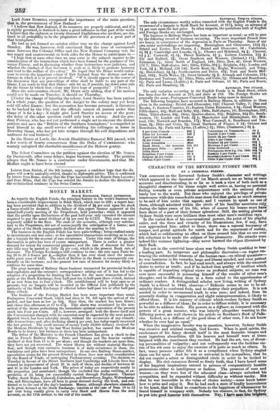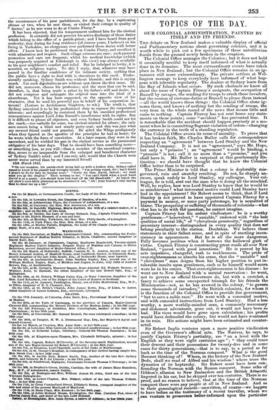CHARACTER OF THE REVEREND SYDNEY SMITH.
BY A PERSONAL FRIEND.
TILE comment on the Reverend Sydney Smith's character and writings which appeared in the Spectator of 1st March struck me as being at once accurate and discriminating, in so far as it took a view of both such as a thoughtful observer of his times might well arrive at, having no personal feeling towards or even private acquaintance with the eminent divine lately lost to the world. But those who enjoyed the privilege of private intercourse with this remarkable man must feel that quite as much remains to be said of him" under that aspect; and I venture to speak as one of them, although admitted within the circle of _his familiar associates only during the latter years of his life, when of course his beams must have been shorn of a part of their former splendour. Still, the setting glories of Sydney Smith were more brilliant than most other men's meridian rays. In the varied flow of his conversational powers, the point of his playful satire, and the force and vivacity of his illustrations, few, if any, have ever approached him : added to these, there was a natural buoyancy of temper, and genial aptitude for mirth and for the enjoyment of society, which had so exhilarating an effect on those around him that no one over felt reluctant to be made the subject of his pleasantry. His attacks were indeed like summer lightning—they never harmed the object illumined by their flash.
But not in the convivial hour alone was Sydney Smith qualified to bear a leading part. In temperate and philosophic discussion—on topics em- bracing the substantial interests of the human race—on ethical questions— he was luminous in his remarks, large and liberal-minded, and even patient of contradiction. In fact, he had read much, and always with the sincerest desire to arrive at truth; and if he lacked that quality of intellect which is capable of imparting original views on profound subjects, no man was ever more successful in possessing himself of the results of other men's thoughts, and in diffusing them in a form suited to the apprehension of ordinary readers. A distinguished scholar now living, writing of Sydney Smith to a friend in 1840, observes—" Ridicule seems to me to be ad- mirably fitted to confound fools, and to destroy their prejudices. It is not needed in order to recommend truth to wise men; and indeed, from its generally dealing in exaggeration and slight misrepresentation, is likely to offend them. It is his mastery of ridicule which renders Sydney Smith so powerful as a diffuser of ideas; for in order to diffuse widely, it is necessary to be able to address fools. His powers as a diffuser, as compared with the powers of a great inventor, who was latterly altogether wanting in the diffusing power, are well shown in his article on Bentham's Book of Falla- cies. Indeed, as a diffuser of the good ideas of other men, I do not know whether he ever had an equal." When the imaginative faculty was in question, however, Sydney Smith , was creative and original enough, God knows. When in good spirits, the , exuberance of his fancy showed itself in the most fantastic images and most ingenious absurdities, till his hearers and himself were at times fatigued with the merriment they excited. He had the art, too, of divest- ing personalities of vulgarity; and not unfrequently was the luckless vic- tim of his wit seen to enjoy the exercise of it quite as much as others. In fact, many persons rather felt it as a compliment when Sydney singled ' them out for sport. And ho was so universal in his sympathies, that he did not require a select or distinguished circle in order to be incited to display. His rich resources flowed so freely forth, that I have heard some of his happiest inspirations uttered to persons of comparatively humble _ pretensions either to intelligence or fashion. The presence of men and women—so they were but of the educated class—always unlocked his sympathies, and he expanded without difficulty as without vanity. Not that he was insensible to the value of choice society—none knew better how to prize and enjoy it. But he had such a store of kindly benevolence in his heart, that he liked to contribute to the happiness of whomsoever he found himself in company with. Nobody too obscure, in fact, for Sydney to put into good humour with themselves. Nay, I him seta him hnichfetk.
the countenance of his poor parishioners, for the day, by a captivating phrase or two, when he met them, or visited their cottage in quality of doctor," as he was wont to do at Combe Florey.*
It has been objected, that his temperament unfitted him for the clerical profession. It certainly did not prevent his active discharge of those duties which belong to the office of a parish-Priest; and I have heard from good authority, that during his long residence (of sixteen years, I believe) on his living in Yorkshire, no clergyman ever performed those duties with better effect. I know how he performed them at Combe Florey, and recollect it with admiration and respect. Such village sermons are rare; such pastoral protection and care not frequent; whilst his medical knowledge (which was purposely acquired at Edinburgh in this view) was always available to his poor neighbour's comfort and relief. But he indulged iu levity, it is asserted, on religious topics. To this I reply, that, whatever may have passed in the familiar confidence of his intimate society, nothing that the public have a right to deal with is obnoxious to this cavil. Profes- sionally speaking, Sydney Smith was without blemish; and this is saying much. Let such dignitaries as are without spot throw the first stone. He did not, moreover, choose his profession; and the most that can be said, therefore, is, that being made a priest by his father's will and desire, he did not compress and subjugate the original man into the ideal of a churchman. Yet it has been suggested, on the opposite view of his character, that he used his powerful pen in behalf of his corporation in- terests! (Letters to Archdeacon Singleton, to wit.) The truth is, that Sydney conceived it to be his professional duty to espouse the corporation interests; and accordingly he sustained them by his onesided professional remonstrance against Lord John Russell's interference with its rights. But it is difficult to please all objectors, and even Sydney Smith could not hit the mark,—too catholic for some, too clerical-minded for others; the only sure course being a blind and steady party-zeal: and this was just what my revered friend could not practise. He aided the Whigs prodigiously when they figured as the apostles of the principles he had at heart; for he wrote with the force of conviction. At a later season, they were in the ascendant, and he wielded his pen in the clerical service as the paramount obligation of his later days. That he should have been something more— or something Jess, as you will—than a member of the sacerdotal corpora- tion, seems to me inseparable from the enlarged and beneficent character of Sydney Smith's mind: and I can only add, would that the Church were never worse served than by my lamented friend!
10th March 1845.
a'On one occasion, his parish-clerk being laid up with a broken shin, Sydney called reamd to know if his plaister had wrought benefit. " I'm getting round, Sir • but I doubt Kahan% be fit for duty by Sunday next." "Sorry for that, David, indeed ; we shall miss you at the singing." Then turning to me, You can't think what a good hand David is at a psalm —you should bear him lead off the. Old Handred1h." At wbich the old clerk's eyes fairly glistened as he stammered out, " Ah I your honour's only saying that to cheer me up a bit."



























 Previous page
Previous page